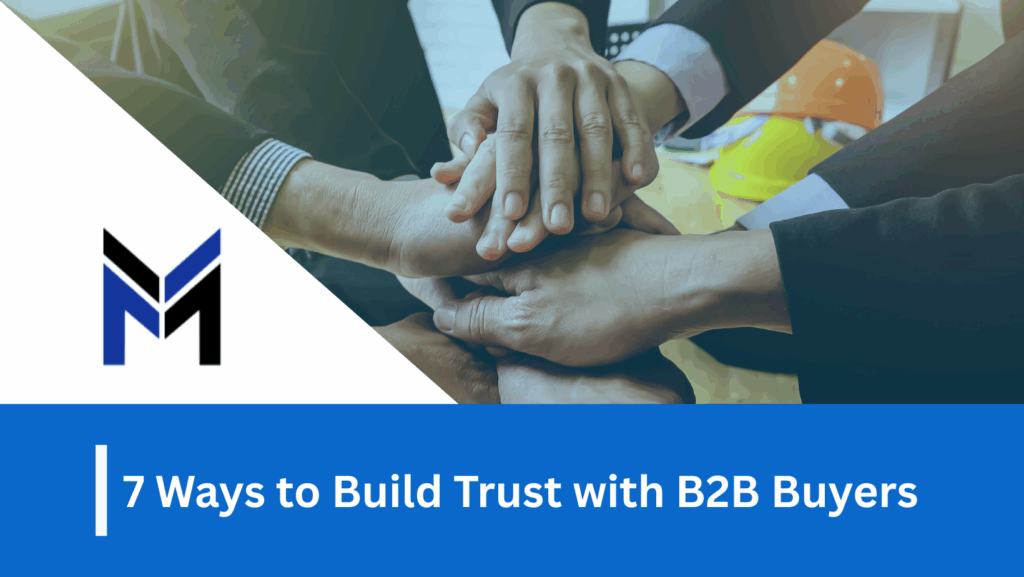In business-to-business transactions, trust is not optional; it is not only a nice-to-have. Business-to-business buyers today are more knowledgeable, watchful, and particular than ever before. They no longer just depend on bright marketing or product requirements because they have a limitless number of options at their discretion. They look for reliable suppliers who are aware of their difficulties and who they can count on to provide consistent value over time.
According to a study by LinkedIn and Edelman, 80% of business-to-business decision-makers agree that trust is important when making purchases. However, many businesses keep underscoring the importance of trust and place too much focus on short-term strategies. Here are seven proven methods to establish lifelong trust with business-to-business buyers and establish your company as a dependable and trustworthy partner.
1. Prioritize Transparency from Day One
The foundation of any long-lasting relationship is honesty. This means being transparent about costs, outcomes, abilities, and any challenges in business-to-business transactions. Transparency is essential whether you’re communicating directly with people or using a business-to-business email list. As opposed to exaggerating and underdelivering, be upfront about any limitations in your solution. Make contracts simple to read, steer clear of unstated costs, and be transparent about your customer success stories and setback management techniques. Customers will value your honesty and are more likely to remain with an open partner, even if things don’t work out.
2. Establish Thought Leadership
Businesses that are knowledgeable about their sector have been chosen by business-to-business buyers. Knowledge can be shown through webcasts, white paper publishing, information communication, and comments on market developments. You transform from a supplier into a trusted professional when you consistently create helpful, instructive content that assists customers in solving actual issues.
3. Showcase Social Proof and Case Studies
Connecting with people who have been on the same journey as you is one of the best ways to build trust. Third-party assessments, reports, and comments comfort new clients about your capacity to deliver. However, don’t stop with compliments. Give information. Describe the difficulties a client came across, how your solution helped, and the tangible results achieved. For example, employing a created European business email list to show how your marketing effort generated return on investment could improve the impact of your results. Decision-makers find a great resonance in numbers and results.
4. Listen First, Sell Second
Too many businesses promote their goods without considering the unique demands of the customer. When customers are made to feel understood and heard, trust increases. Using intelligent requests is a good way to start sales interactions. Analyze their objectives, emotions, and pain areas. You should start mapping your solution to their situation only after that.
5. Deliver Consistent Communication
One of the fastest ways to damage trust is through inconsistent or late communication. Customers want to know that they can get in touch with you when they need to and that you will keep them updated throughout the partnership. Provide timely answers to questions, give regular project updates, and establish clear expectations for deadlines and deliveries. Keeping the buyer informed maintains credibility even if there is a delay.
6. Invest in Relationship Building, Not Just Transactions
One transaction does not build long-term trust. It is developed slowly through truthful, continuous relationship-building. This involves keeping contact with your customers after the sale. Provide post-purchase assistance, offer invitations to special webinars, follow up with them sometimes without making a sales pitch, and acknowledge their achievements. Trust grows when customers believe that you are interested in their success rather than just your financial gain.
7. Follow Through on Your Promises
The simplest and most effective method to establish trust is to regularly accomplish what you say you’ll do, when you say you’ll do it. This might be simple. Every small promise is an opportunity to demonstrate reliability, whether it’s presenting a proposal by Friday or fixing a support issue within 24 hours. That reliability can be increased by doing something as easy as following up with a CIO email list as agreed. Even small promises that are broken create doubts. In contrast, consistent follow-through strengthens your standing as a reliable collaborator.
Final Thoughts
The currency of business-to-business connections is trust. Long-term business is won through trust, even while compelling marketing and creative proposals may be successful. Being open, dependable, and truly helpful can help you establish your business as more than just a supplier. Trust is more than just a difference in a market; when buyers become flooded with options, it’s a deal maker.




